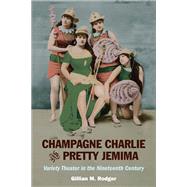Champagne Charlie and Pretty Jemima
, by Rodger, Gillian M.- ISBN: 9780252077340 | 0252077342
- Cover: Paperback
- Copyright: 6/1/2010
In this rich, imaginative survey of variety musical theatre, Gillian M. Rodger masterfully chronicles the social history and class dynamics of the robust, nineteenth-century American theatrical phenomenon that gave way to twentieth-century entertainment forms such as vaudeville and comedy on radio and television. Fresh, bawdy, and unabashedly aimed at the working class, variety honed in on its audience's fascinations, emerging in the 1840s as a vehicle to accentuate class divisions and stoke curiosity about gender and sexuality. Cross-dressing acts were a regular feature of these entertainments, and Rodger profiles key male impersonators Annie Hindle and Ella Wesner while examining how both gender and sexuality gave shape to variety. By the last two decades of the nineteenth century, variety theatre developed into a platform for ideas about race and whiteness. As some in the working class moved up into the middling classes, they took their affinity for variety with them, transforming and broadening middle-class values.Champagne Charlie and Pretty Jemimaplaces the saloon keepers, managers, male impersonators, minstrels, acrobats, singers, and dancers of the variety era within economic and social contexts by examining the business models of variety shows and their primarily white, working-class urban audiences. Rodger traces the transformation of variety from sexualized entertainment to more family-friendly fare, a domestication that mirrored efforts to regulate the industry, As well as the adoption of aspects of middle-class culture and values by the shows' performers, managers, and consumers.







